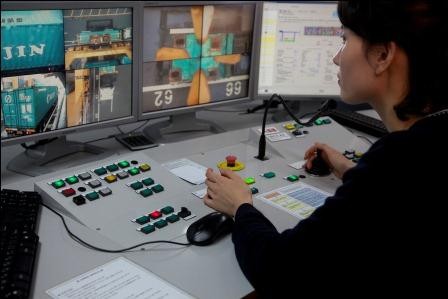ABB to supply integrated power system for nine shuttle tankers
In a major step towards more efficient offshore operations, Samsung Heavy Industries Co., Ltd. (SHI) and ABB have signed an agreement to equip a fleet of shuttle tankers with ABB’s...

Image: ABB
Remote control of cranes improves productivity and working ergonomics. The new Maasvlakte 2 container terminals will be first in Europe to operate without a driver on board
Zurich, Switzerland — Global power and automation technology firm ABB announced today that they have recently won contracts from two major container terminal operators, APM Terminals and Rotterdam World Gateway (RWG) to provide automation systems for their new ship-to-shore cranes.
ABB’s delivery will enable the cranes to be operated remotely, without a driver on board, improving overall efficiency.
The two new terminals that will open in 2014 in Rotterdam at Maasvlakte 2 will be the first in Europe to use remote control of ship-to-shore (STS) cranes, and the terminal of APM Terminals will be the first in the world where STS cranes have no driver’s cabin installed.
“These projects underscore the need for fast and cost-effective container handling, and how the latest automation technologies can be applied to dramatically increase efficiency as a response to higher productivity requirements,” said Veli-Matti Reinikkala, head of ABB’s Process Automation division.
The remote control of cranes improves overall productivity and working ergonomics for crane operators. The new terminals of APM Terminals and RWG in Rotterdam are designed to serve the largest container ships, which require lifting heights of over 50 meters. ABB’s system for remote control of STS cranes has the crane operators working in a control room located in the terminal building, where they supervise the cranes. This will improve working ergonomics and help reduce the stress on operator’s back and neck.
Operators supervise the crane motion via onboard cameras; often the camera views are more comprehensive than the views available from inside the crane cabin. Combined with access to control information provided by the automation system, these help to improve overall operator performance.
With a crane operator on board, crane acceleration and deceleration rates are limited. With no operator on board, the crane can run faster and ramp times can be shorter. This enables significantly shorter cycle times to unload an entire ship’s worth of cargo.
ABB’s system automates the crane’s corrective movements to ensure accuracy and speed. With no operator on board, more aggressive corrections can be made, which further reduces cycle times and contributes to higher productivity.
Over the years, ABB has delivered automation and electrification for almost 400 stacking cranes and nearly 600 STS cranes. With the recently awarded projects ABB’s remote control technology for STS cranes has made a breakthrough on the market. The first remotely controlled STS crane has been in commercial operation since December 2010 in Panama, where ABB worked in close cooperation with Manzanillo International Terminal (MIT) to develop the remote control technology for STS cranes.

Sign up for gCaptain’s newsletter and never miss an update

Subscribe to gCaptain Daily and stay informed with the latest global maritime and offshore news


Stay informed with the latest maritime and offshore news, delivered daily straight to your inbox
Essential news coupled with the finest maritime content sourced from across the globe.
Sign Up